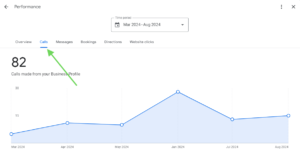 In a significant shift for businesses relying on Google Business Profiles (GBP), Google announced the removal of the call tracking feature, effective July 31, 2024. This decision marks a pivotal change for businesses that have utilized this feature to gain insights into customer interactions and optimize their marketing strategies. While no one knows exactly why they decided to make this dramatic shift it is being chalked up to consumer privacy. We suspect it may have something to do with money as well, as call tracking can get expensive, particularly at volume.
In a significant shift for businesses relying on Google Business Profiles (GBP), Google announced the removal of the call tracking feature, effective July 31, 2024. This decision marks a pivotal change for businesses that have utilized this feature to gain insights into customer interactions and optimize their marketing strategies. While no one knows exactly why they decided to make this dramatic shift it is being chalked up to consumer privacy. We suspect it may have something to do with money as well, as call tracking can get expensive, particularly at volume.
Background and Significance of Call Tracking
Call tracking has been an integral part of GBP, allowing businesses to monitor phone calls generated through their listings and understand exactly where calls are coming from. This feature provided valuable data on call frequency, duration, and origin, enabling businesses to assess the effectiveness of their online presence and marketing campaigns. By understanding which marketing efforts led to phone inquiries, businesses could make informed decisions about resource allocation and customer engagement strategies.
Reasons Behind the Removal
Google's decision to discontinue call tracking in GBP stems from several factors, according to them. Primarily they say, the feature experienced relatively low usage, prompting Google to prioritize higher-impact features for merchants. Additionally, privacy concerns and data protection regulations may have influenced the decision, as reducing data collection aligns with broader industry trends towards enhanced user privacy. In terms of low usage, we can not at all imagine this would be true. Any marketing pro worth their weight looks that these numbers constantly for Local SEO efforts.
Impact on Businesses
The removal of call tracking presents challenges for businesses that relied on this feature for local SEO and customer engagement. Without insights into phone inquiries driven by local search, businesses may find it difficult to track return on investment (ROI) and optimize their strategies. This change necessitates a shift towards alternative methods for tracking and analyzing customer interactions.
![]()
Exploring Alternative Solutions
To adapt to the discontinuation of Google's call tracking, businesses are encouraged to explore third-party call tracking solutions. These platforms offer robust features, such as detailed analytics, call recording, and integration with customer relationship management (CRM) systems. By leveraging these tools, businesses can continue to gain insights into customer interactions and optimize their marketing efforts.
Adapting Customer Engagement Strategies
The removal of call tracking also prompts businesses to rethink their customer engagement strategies. With the loss of direct communication channels through GBP, businesses may need to diversify their communication methods, utilizing platforms like social media, email, and direct website interactions. This shift encourages businesses to adopt a multi-channel approach, ensuring continued engagement with customers across various touchpoints.
Conclusion
The removal of call tracking from Google Business Profiles represents a significant change for businesses that have relied on this feature to enhance their marketing strategies and customer interactions. While the decision poses challenges, it also presents an opportunity for businesses to explore alternative solutions and diversify their engagement strategies. By embracing third-party call tracking tools and adopting a multi-channel approach, businesses can continue to optimize their marketing efforts and maintain strong customer relationships in the evolving digital landscape.
At Local Blitz we have been using third-party tracking systems for well over a decade and plan to implement these directly with GBP as needed. The main issue with this approach is getting the numbers to stick. Meaning that as Google updates it's directories it will likely constantly swap the tracking number for the old number, meaning that our team is tasked with ensuring that the tracking numbers stay in place to best serve our clients with robust data sets.

